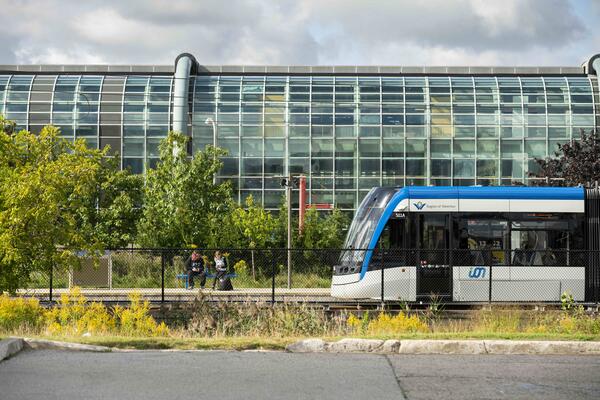
Future cities depend on the future countryside
Environment alum, Kent Willmore (BES '94), is safeguarding the integrity of Canadian farmland for future generations

Environment alum, Kent Willmore (BES '94), is safeguarding the integrity of Canadian farmland for future generations
By Faculty of EnvironmentFarmers feed cities, or so the saying goes. But more than a snappy line it captures the reality of Canada where a few hundred thousand people diligently working the land put food on the tables of tens of millions of people across the country.
Waterloo Environmental Studies grad, Kent Willmore (BES '94, Geography), knows this truth as well as anyone — that the health of Canada’s future cities will depend on its future countryside. It explains, in part, why he founded and runs AGInvest Farmland Properties Canada. This innovative investment company provides the seed money for a new generation of farmers to enter the industry. It’s a calling, as well as a job, that comes naturally for him.
Born and raised on a farm outside Chatham, Ontario, Willmore knew first-hand the rewards, toils and tribulations of working the land and he wanted to help others who yearned for that life.
“As a younger person trying to buy farmland, I struggled. I watched farmers live cash-poor and die wealthy. I thought that was wrong,” he says. “I wanted to help the old, the young and the environment while providing investors an opportunity.”
Even so, the path that took the southern Ontario farm boy to today’s business executive was winding. He came to the University of Waterloo in 1990 to play with the Waterloo Warriors football team, which he did well enough to be named an all-Canadian academic athlete. He enrolled in the Environmental Studies program as it was the only degree that he was interested in that would equip him with an understanding of conservation, sustainability, and science-based decision-making lessons that would benefit his future endeavors. He came to learn that what makes sense for the environment also makes good sense for business.
Willmore paid for his university education with the earnings from the seed corn company he started at the age of 14, which is still running today. Later, in his late 20s, he started buying farmland independently and began to watch his equity grow. A turning point came in 2010 when a banker told Willmore that he could not obtain a loan to buy additional farmland. Realizing other young people were having the same problem, he looked for a solution. In 2012, he launched AGinvest.
The concept is straightforward. AGinvest attracts investors and, since 2018, has been using the capital to buy and improve farmland, which it leases to farmers. So far, the company has partnered with more than 30 farm families and purchased more than 7,000 acres of premium farmland — and that is just beginning.
“It’s a great opportunity for the investors because farmland is a safe haven to put your money,” Willmore says. “It performs extremely well during periods of inflation. It has a long-term track record of steady appreciation.”
As land prices rise, which they’ve consistently done for more than 70 years, so does the value of their investment. After a specified number of years, investors can reap a healthy profit and cash out; or re-invest.
Farm families own 98 per cent or more of Ontario’s farmland. If no family member wants to take over the operation, older farmers often struggle over what to do with their land. Meanwhile younger people who dream of farming can hit a roadblock when faced with the cost of land and equipment. Through AGinvest, Willmore is meeting the needs of both groups, allowing one generation to exit agriculture and another to enter it, all in a financially viable way.
All of these investors are Canadian. The amount they’ve put into AGinvest ranges from the minimum of $150,000 to tens of millions. Although the company currently manages $120 million in farmland on behalf of investors, Willmore said that represents a tiny portion of Canadian farmland, which is worth close to $700 billion nationally.
While AGinvest is strengthening the fabric of rural communities, its benefits extend beyond the countryside. As communities grow around cities like Toronto, Willmore said preserving farmland is a food security issue for everyone. In addition, AGinvest is passionately committed to the environment. Its rental agreements include provisions to maintain and protect soil, guard against erosion and sequester carbon as part of the fight against climate change.
“There’s a continuous struggle between the expansion of cities and the food supply which we’re trying to address,” he says. “One of our goals is to connect people in cities to the land by way of a strategic investment opportunity.”

Read more
From transforming solutions for homeownership to advancing health care interventions, Waterloo talent continues to disrupt industries and drive change

Read more
The 2025 Narwhal list highlights top Canadian tech companies poised for big growth

Read more
The real estate decision-making tool raises $4 million USD in seed funding to accelerate innovation in housing and property development
The University of Waterloo acknowledges that much of our work takes place on the traditional territory of the Neutral, Anishinaabeg, and Haudenosaunee peoples. Our main campus is situated on the Haldimand Tract, the land granted to the Six Nations that includes six miles on each side of the Grand River. Our active work toward reconciliation takes place across our campuses through research, learning, teaching, and community building, and is co-ordinated within the Office of Indigenous Relations.